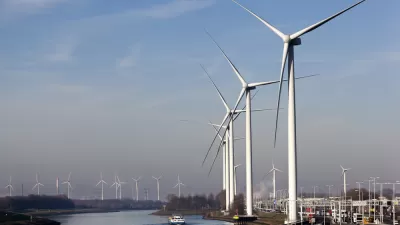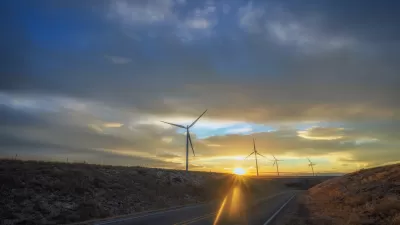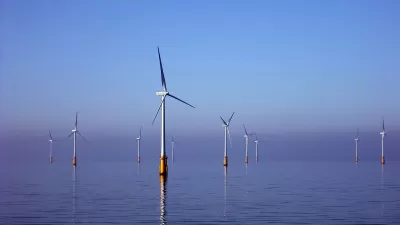Tribal communities claim that a major wind energy project threatens sensitive cultural and environmental resources.

A group of tribal communities in Washington state is suing to stop a massive wind energy project, “alleging that the decision-making process sidestepped state law and failed to mitigate potential damage to the tribe’s treaty-protected natural and cultural resources.”
As Natalia Mesa explains in High Country News, the project, which includes three solar arrays and over 200 wind turbines, extends into Yakama ceremonial sites and historically and culturally important areas. “Development would also impact the natural habitat of pronghorn and ferruginous hawks, a threatened species featured prominently in Yakama Nation ceremonies.”
The proposal has gone through several iterations after the state’s Energy Facility Site Evaluation Council (EFSEC) recommended that the developer downsize the project and take steps to mitigate any potential harms. “Tri-Cities C.A.R.E.S., a group of homeowners, and Benton County also filed lawsuits. The lawsuits are separate but similar, and they cite different concerns: Tri-Cities C.A.R.E.S. sued mainly to protect homeowners’ viewshed and property values, while Benton County contends that the project would significantly disrupt the area’s agricultural industry.”
The controversy highlights a flaw in the state’s permitting system, which doesn’t call for public and tribal consultation until after a project proposal is submitted. “Audubon, tribes and other stakeholders are currently in talks with developers and state officials, pushing for a new approach that requires consultation with tribes and local governments before projects are approved. Instead of having developers submit plans, tribal nations and local governments would establish “build-ready” sites — sites that are pre-vetted for clean energy buildout.”
FULL STORY: Tribes sue after massive wind farm in Washington gets green light

Alabama: Trump Terminates Settlements for Black Communities Harmed By Raw Sewage
Trump deemed the landmark civil rights agreement “illegal DEI and environmental justice policy.”

Planetizen Federal Action Tracker
A weekly monitor of how Trump’s orders and actions are impacting planners and planning in America.

The 120 Year Old Tiny Home Villages That Sheltered San Francisco’s Earthquake Refugees
More than a century ago, San Francisco mobilized to house thousands of residents displaced by the 1906 earthquake. Could their strategy offer a model for the present?

LA’s Tree Emergency Goes Beyond Vandalism
After a vandal destroyed dozens of downtown LA trees, Mayor Karen Bass vowed to replace them. Days later, she slashed the city’s tree budget.

Sacramento Leads Nation With Bus-Mounted Bike Lane Enforcement Cameras
The city is the first to use its bus-mounted traffic enforcement system to cite drivers who park or drive in bike lanes.

Seattle Voters Approve Social Housing Referendum
Voters approved a corporate tax to fund the city’s housing authority despite an opposition campaign funded by Amazon and Microsoft.
Urban Design for Planners 1: Software Tools
This six-course series explores essential urban design concepts using open source software and equips planners with the tools they need to participate fully in the urban design process.
Planning for Universal Design
Learn the tools for implementing Universal Design in planning regulations.
Ada County Highway District
Clanton & Associates, Inc.
Jessamine County Fiscal Court
Institute for Housing and Urban Development Studies (IHS)
City of Grandview
Harvard GSD Executive Education
Toledo-Lucas County Plan Commissions
Salt Lake City
NYU Wagner Graduate School of Public Service





























